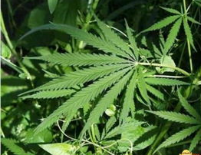- 阅读
- 阅读
- 技巧
- 百科
- 试题
- 文化
- 技能
As governments around the world update their policies towards the legality of cannabis,
随着世界各国政府更新本国对大麻合法化的政策,
that drug's medical and recreational use is spreading.
毒品的药用和娱乐用途正在扩大。
Many women therefore want to know whether it is safe to take the stuff during pregnancy,
因此很多女性都想知道孕期使用大麻是否安全
and face a dearth of evidence to guide them. The use of cannabis by pregnant women is on the rise.
但却面临着缺乏指导证据的窘境。食用大麻的孕妇人数在增长。

Neuroscientists' concerns about using cannabis during pregnancy stem from the fact that,
神经科学家的对孕期使用大麻的担忧源于这样一个事实,
in developing brains, the endocannabinoid system directs cell growth,
在发育的大脑中,内源性大麻素系统指导这细胞增长、
the differentiation of neurons and the way in which neurons grow, form junctions with each other and are pruned.
神经元的分化以及神经元生长、与彼此形成连接以及被修剪的方式。
Dr Melis administered low doses of THC (equivalent to a single, mild joint) to pregnant rats.
Melis博士给怀孕老鼠注射了低剂量的THC(相当于一根温和的大麻烟卷)。
She then looked at the behaviour and neurobiology of the offspring. One test happened in the third and fourth week after birth.
然后她观察了它们后代的行为和神经。其中一次测试发生在出生后的第三周和第四周。
A second was when the animals were older—an age roughly equivalent to the period just before adolescence in humans.
第二次是在动物更大一点的时候—这个年龄大致相当于人类进入青春期之前的时期。
Before the second test, the youngsters were given a dose of THC.
在开始第二次试验之前,小老鼠被注射了一剂量的THC。
Dr Melis found that exposing rat embryos to THC rewired the part of the brain that handles reward and motivation—but only in males.
Melis博士发现将老鼠胚胎暴露在THC环境中,大脑中负责奖励和激励的部分会重新连接起来,但这只发生在雄性老鼠身上。
Neurons in this area were more excitable than those in control animals when stimulated by dopamine,
当受到多巴胺(在神经元之间传递信息的化学物质)的刺激时,这个区域的神经会比对照组
another chemical that carries messages between neurons. They also fired off their electrical impulses at a higher frequency.
老鼠这个区域的神经更加兴奋。它们还以更高的频率发射电脉冲。
In people, says Dr Melis, hyperactive dopamine neurons of this sort are a feature of vulnerability
Melis博士表示,对人类而言,这种极度活跃的多巴胺神经元是一系列精神疾病
to a range of psychiatric disorders that include schizophrenia, mania and drug addiction.
的易感性特征,包括精神分裂症、狂躁症和药物成瘾。
Another effect that Dr Melis detected was impaired "sensorimotor gating".
Melis博士检测到的另一个影响是“感觉运动门控”受损。
This is the way that a brain filters out superfluous information and prevents an overload of data.
这是大脑过滤掉多余信息并防止数据过载的方法。
These underlying neurological changes did not, however, manifest themselves immediately as changes in behaviour.
然而,这些潜在的神经变化并没有立即表现为行为上的变化。
Instead, the rats concerned acted normally until given their preadolescence doses of THC.
相反,这些老鼠的行为都很正常,直到注射了青春期前剂量的THC。
At this point their behaviour changed, as they became hyperactive and increasingly likely to take risks.
在这个时候,它们的行为发生了变化,它们变得亢奋,冒险的可能性增加。
Though it is sometimes hard to translate work done on rodents to human beings—particularly in this case,
尽管有时很难将在啮齿动物身上完成的工作转化到人类身上—尤其是在这种情况中,
when only males seem affected—Dr Melis's findings lend support to the conclusions of observational studies
似乎仅有雄性受到了影响—Melis博士的发现为观察性研究的结论提供了支持,
which suggest that prenatal exposure to cannabis leads to increased susceptibility to a range of mental health problems.
这些研究表明,产前接触大麻会导致换上一系列精神健康问题可能性增加。
There was one intriguing positive finding.
还有一个有趣的积极发现。
The authors were able to correct their rats' behavioural and neurological abnormalities by dosing them with pregnenolone,
作者们可以通过给老鼠服用孕烯酮来纠正它们的行为和神经异常,
a drug currently undergoing tests for the treatment of cannabis addiction, schizophrenia, autism and bipolar disorder.
孕烯酮是一种目前正在接受测试的药物,可用于治疗大麻成瘾、精神分裂症、自闭症和双相情感障碍。
But the long and short of the work done thus far is that consuming cannabis during pregnancy is far from safe.
但到目前为止,所做的工作中有一点值得注意,那就是在怀孕期间服用大麻是很不安全的。
来源:经济学人
参与评论